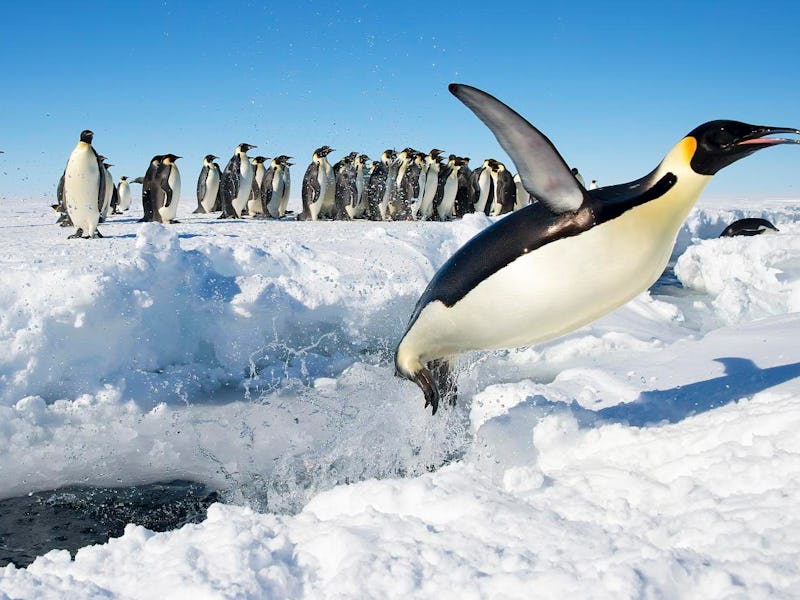Sneaky Emperor Penguins Know the Importance of Snacks When it's Cold Out
Turns out they dive at night, too.

The 2005 documentary March of the Penguins taught many of us that male emperor penguins endure a grueling four-month fast while they incubate their eggs. Many of us — included this reporter — were enchanted and inspired by the devotion and selflessness these penguin fathers displayed as they carefully balanced a single egg on each pair of feet while circulating in a massive cluster to share the warmth. For those of you who don’t know, Emperor penguins in Antarctica migrate as far as 60 miles to their breeding grounds from the sea to mate and lay their eggs. Males care for the eggs while the females travel back to the sea to feed. During this time, scientists have long thought the males went about 115 days without food, an epic feat of self-denial.
Well, prepare to be a little disenchanted. We know penguins might cheat on their mates, like humans, but it turns out they might also cheat on their winter diet, like humans. In a paper published Tuesday in the Journal of Experimental Biology, researchers describe how they observed emperor penguins swimming in the dark during the period when they’d normally be expected to be fasting. In other words, they probably only fast for about half as long as previously suspected.
Emperor penguins might snack during their long winter incubation, changing what we thought about their fast period.
Gerald L. Kooyman, and Robert P. van Dam of Scripps Institution of Oceanography, along with Luis A. Hückstädt of the University of California, Santa Cruz, set out to the Ross Ice Shelf in Antarctica during the winter of 1998. They spent May 28 and 29 at the Cape Washington emperor penguin colony, one of the biggest emperor colonies in the world. This location is a little different from other emperor colonies, in that the penguins’ breeding ground is only about four kilometers (2.5 miles) from the sea.
Emperor penguins famously raise one offspring at a time in pairs.
Nobody had ever taken a ship to that location in winter, but the researchers successfully reached the edge of the ice. Here’s what they saw after disembarking:
“As we trekked the ∼4 km in the moonless dark to the colony, we noted many fresh tracks leading to and from the colony, and saw two groups of 6 and 30 birds returning from the polynya, an area of open water surrounded by sea ice. Also, from the ship, one of the party observed a group of 30 emperor penguins swim by. Later, members of the team returning from the sea ice to the ship saw about 45 birds pass close to the ship in the water. About 30 penguins were seen negotiating the rafted ice near the ice edge. On close approach to the ship five more were seen.”
The researchers tagged several penguins with saltwater-activated satellite trackers. They showed that the penguins were diving in the dark, which is unprecedented.
This revelation is wild because penguins don’t usually dive in the dark. It can be dangerous for a couple huge reasons, namely that predators like leopard seals can take them by surprise, and temporary breathing holes could close up, leaving the birds trapped under the ice. As a group, as the scientists observed, night swims could be safer.
In addition to their direct observations, the scientists fitted four penguins with satellite tracking gear, including salt-activated sensors that activate when the penguins dive into seawater. In the coming months, they saw that these particular penguins ventured into the water while it was still dark, suggesting that the groups they saw weren’t flukes.
But why does this matter? It fleshes out our understanding of emperor penguins, our knowledge of whose mating and foraging behaviors is based on startlingly few direct observations. This paper suggests that feeding around the time that emperor penguins mate is actually much more common than anyone has thought and that all this snacking could lead to greater reproductive success due to shorter fasting times
If these findings can be replicated by other researchers, then it looks like emperor penguins are more like us than we thought: Even when they say they’re dieting, they’re actually cheating, sneaking snacks in the middle of the night.
Abstract: All through the bird literature and feature films, there is much ado about dedicated emperor penguin males fasting for 115 days while they do all the incubation of the single egg. Sometimes, they may not fast for so long. Based on a winter visit to Cape Washington, we obtained evidence that some birds may feed before the egg is laid, and if they do, and some are males, then their fast is much less than 115 days. The consequence of a shorter fast for the male is a better chance of completing the 65 day incubation fast and success in fledging the chick. For those in northern colonies that may migrate south, there will be closer access to open water, but there will be the need to dive in the dark.